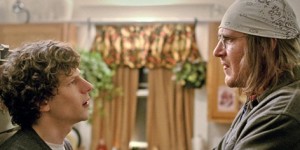 The End of the Tour, a film by James Ponsoldt, succeeds at doing some things that aren’t supposed to work in movies. It explores the inner life of writers and why they write. It reproduces the rhythm of ordinary day-to-day life. Most remarkable of all, the film consists almost entirely of two people talking. The important thing, however, is that the talk is interesting.
The End of the Tour, a film by James Ponsoldt, succeeds at doing some things that aren’t supposed to work in movies. It explores the inner life of writers and why they write. It reproduces the rhythm of ordinary day-to-day life. Most remarkable of all, the film consists almost entirely of two people talking. The important thing, however, is that the talk is interesting.
The film dramatizes an actual five-day encounter between two real people, the writer David Foster Wallace, author of the huge postmodernist novel Infinite Jest, and David Lipsky, a writer and reporter for Rolling Stone who traveled to Wallace’s Illinois home to interview him for the magazine in 1996, shortly after the publication of Infinite Jest and the sudden rise to fame of its author.
Wallace is played by Jason Segel, an interesting choice. Up until now he’s been known primarily as an actor in sitcoms and youth-oriented comedies. Here, in long hair and a headband, and projecting his character’s shy diffidence, Segel avoids caricature, creating a person that feels intimate, thoughtful, and real.
Lipsky is played by Jesse Eisenberg. His hyper-nervous intellectual persona fits the part perfectly. Eisenberg has never been afraid to show the obnoxious side of a character, and even though the screenplay by Donald Marguiles is based on Lipsky’s own book, his critical and suspicious outlook towards Wallace is given free rein. Eisenberg emotes awkward self-consciousness, and he’s even a little mean around the edges—the audience may realize long before Lipsky does that he’s actually jealous—jealous of Wallace’s brilliance and fame. The film’s conversations play out within the tension of that unspoken jealousy.
The film opens in 2008, when Lipsky hears the news that Wallace has taken his own life at the age of 46. Then we flash back to 1996 and his request to do the story on the writer. The sadness of knowing how Wallace’s life ended colors our experience of him later, but in the interviews that make up the main content of the film, Wallace rejects the sensational versions of depression that are prominent in the culture. Much of the conversation concerns Lipsky’s fascination with genius and fame, all deflated by Wallace, who has come to realize that these things are ultimately unfulfilling. His obsession is practically the opposite of the typical fame-seeker: above all, he doesn’t want success to ruin his creative identification with the loneliness and suffering of ordinary people.
Lipsky ends up accompanying Wallace on a short book tour in Minneapolis, in which Wallace’s gentle but skeptical attitude towards the people asking him questions echoes his dialogues with Lipsky. A minor incident ends up alienating the two young writers, and although some patching up occurs, the film lets their emotional differences remain without obvious resolution.
The movie is based directly on the tape recordings Lipsky made of the interviews, and this lends it a certain quiet gravity. Wallace’s answers to Lipsky’s questions, and especially his counter-questioning of many of the assumptions behind those questions, sometimes humorous, at other times curt, weave a fascinating portrait not of a consistent world-view, but of an artist wholly committed to being authentically himself. At the same time, Eisenberg’s character is really standing in for our point of view—the puzzled reflection of something only partly understood. Ponsoldt and his two main actors have pulled off quite a coup here—The End of the Tour is an invigorating film of ideas.

